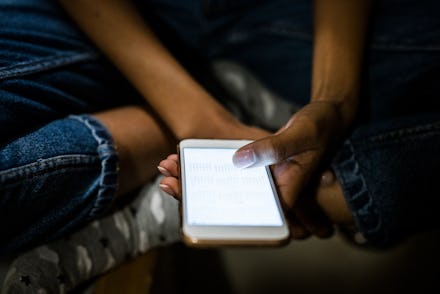Why our perception of time is so messed up right now

Quarantine time is a trip. Before the pandemic hit, time breezed by. Now, the days crawl at a sluggish pace, and each one bleeds into the next. Each week seems to stretch back eons. The upheaval rocking the country has only magnified this feeling. Today, it hit me that George Floyd was killed just over a week ago. Somehow, it feels like months of grief and anger have passed since then. Why is our perception of time so messed up right now?
The easy answer? Our internal clocks and external cues have fallen out of sync, explains Anthony M. Tobia, associate professor of the Division of Consultation Psychiatry at the Rutgers Robert Wood Johnson Medical School. The external cues we’d process without really thinking about it pre-pandemic “just don’t exist anymore, so we’re not automatically doing the things we usually do,” he says. “Therefore, there’s a loss of time perception.”
These external cues can include those unique to us, like when our alarm clock goes off, and when we have breakfast, commute, work, eat dinner, and wind down for the evening. “Having that taken away from your personal life leads to this sense of disorientation," he says.
External cues can also be general, applying to everyone, such as stores, restaurants, and other businesses being open at certain times, Tobia says. In the back of our minds, we might’ve associated Wednesday nights with trivia at our favorite bar, or Friday nights with movie theater dates with bae. But now these establishments are generally closed, which is also disorienting. So, too, is the postponement of most sporting events. Tobia knew if there was a Yankees game in the daytime on a weekday, then it must be Thursday, when they normally play day games.
When I asked Tobia why each day feels eternal, he responded that “there’s nothing to look forward to that gets us through every hour.” That’s why, even though they’re a grind, back-to-back meetings make the day fly by. “For an hour or maybe two hours, you have these high-intensity sprints,” he explains. Now that our normal schedules have dissolved, “it doesn’t feel like we’re doing these sprints anymore.”
Engaging less in the activities that previously defined our days, or "landmark events" also makes each one feel like the next so that they blur together over the long term, Tobia says. This could contribute to why, looking back at the end of a week, or a few weeks, it seems as if that time has passed so quickly, even if the individual days drag on.
This falling apart of our schedules has affected various regions in our brain, primarily subcortical structures, Tobia says. Basically, the brain consists of the cortex and subcortex. Scheduling, say, a meeting in our calendar at a new job involves cortical processing. But automatically anticipating it as something that recurs every Monday after we’ve worked at our job for a year involves subcortical processing.
We also rely on subcortical processing for other routine events we normally wouldn’t consciously schedule, like our commute to and from work. The landmark events that define our days are recorded in a subcortical structure known as the hippocampus, Tobia explains. "Without those hippocampal memories, we lose our landmarks over the past weeks to months," he says. "Hence, they are a blur."
As those of us who’ve ever slept in until noon can attest, a shot sleep schedule can throw off our schedule during waking hours, too.
Other subcortical structures known as the reticular formation and pineal gland play a crucial role in maintaining sleep-wake cycles, he notes They’re especially likely to be affected when we stop following a routine, as so many have amid COVID-19. And as those of us who’ve ever slept in until noon can attest, a shot sleep schedule can throw off our schedule during waking hours, too.
The good news is, you can regain some sense of time. Tobia suggests taking a cue from the film I Am Legend — which, granted, is about a virus that’s killed most of the human population, so watching it might hit a little too close to home — but Will Smith, who plays the lead character, still awakens to an alarm clock. In other words, try as much as possible to stick to your pre-pandemic routine. “People who took those steps certainly have a greater sense of time than those who choose not to,” Tobia says. If you work from home, set your alarm for the time you’d wake up when you still commuted to the office. Eat your meals at the times you normally did. These steps might’ve come naturally before, but now we need to make an effort to take them.
I still set an alarm, but I could probably be better about sleeping at regular times, instead of doomscrolling into the wee hours. At the very least, knowing the science behind why so many of us feel like we’re floating in a time-fog reassures me somewhat by normalizing the sensation, even if it doesn’t completely fix it.